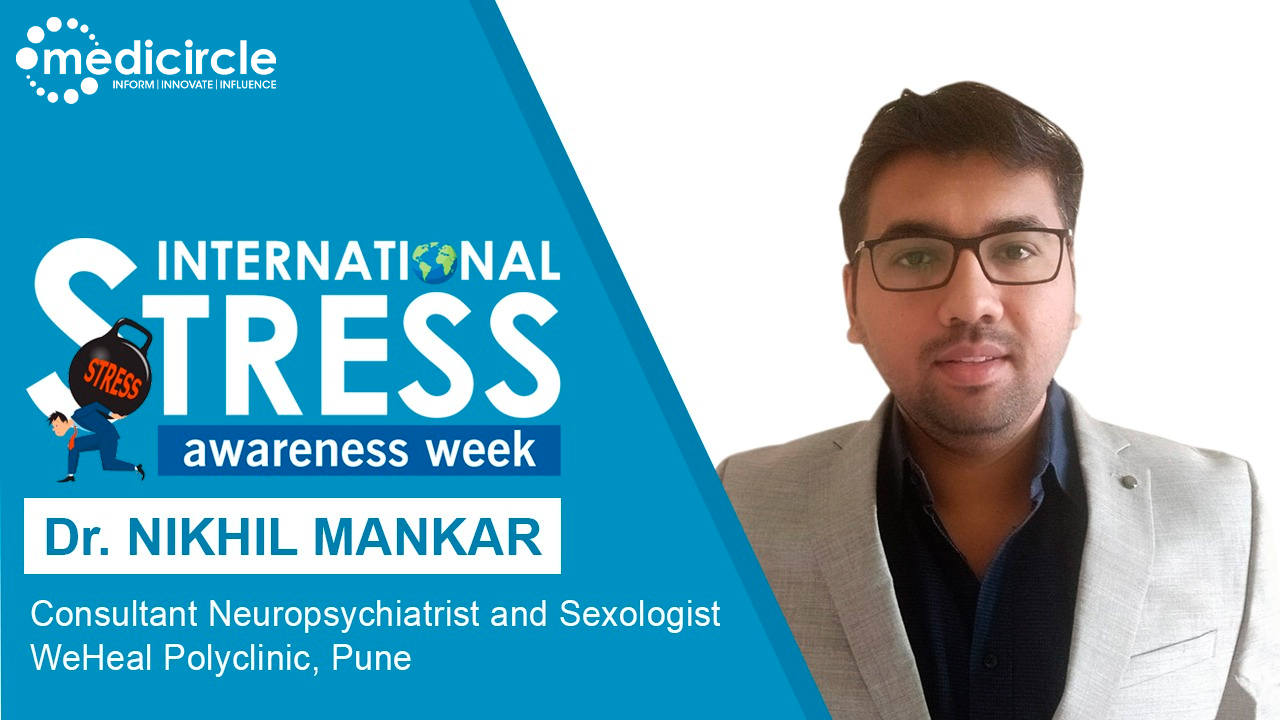The feeling of being overwhelmed or unable to cope with mental and emotional pressure is stress. Stress is our body’s response to pressure. Many different situations or life events can cause stress. Sometimes, this stress response can be useful: it can help us push through fear or pain. However, too much stress can cause negative effects. Long term, this can affect our physical and mental health.
As per the result of a large-scale survey conducted across India in 2019, young adults between the age of 20 and 29 years of both genders were the most stressed in the country. The major cause of high-level stress among young people are peer pressure, pressure to succeed in academics or work and irregular routines. 50% of Indian professionals have reported that an uncertain future is their topmost source of stress as was revealed in a recently concluded survey by The7thFold, a boutique HR and Wellbeing firm.
Every year, the world celebrates International Stress Awareness Week from 1st to 5th November. The day encourages people to sit back, unwind and embrace peace. Awareness about this has become even more significant this year due to the tough times people across the world have gone through in the COVID-19 outbreak. We at Medicircle are conducting the International Stress Awareness Week Series wherein we will be featuring experts in this field to understand and create more awareness about the effects of stress.
Dr. Nikhil Mankar is a Consultant Neuropsychiatrist and Sexologist practicing at WeHeal Polyclinic, Pune. He has experience of more than 9 years in the field of mental health care. He has been awarded best resident doctor at Sir JJ Hospital, Mumbai. He was the Winner of Interstate IPS West zone PG quiz. He was also a Guest speaker at multiple colleges and forums on mental health topics.
The biopsychosocial model of stress
Dr. Nikhil describes, "There are multiple reasons for stress. But we have classified the reasons into the biopsychosocial model of stress.
Biological reasons – Genes, nutrition. The imbalance level of chemicals such as serotonin, dopamine may cause mental disorders or stress.
Psychological reasons – Emotions, behaviors, thinking may also cause stress.
Social reasons – The environment of home and workplace may cause mental stress.
Major life events – Breakup, divorce, failure, finances can take us to stress.
Types of stress
Dr. Nikhil explains the stress types
Positive stress/Eustress – It motivates you and increases focus
Negative stress/Distress – Demotivates you, distracts you
Identify between normal and abnormal stress
Dr. Nikhil discusses different parameters to identify between normal and abnormal stress
Duration – If it is for short term – normal stress, if it is continuous and not going – abnormal stress
Effects - If it is affecting our personal, professional life and quality of our work – Bad stress
If stress is not going even after trying hard and is there continuously – abnormal stress
Getting feeling of self-harm, suicidal thoughts, helplessness, going towards addiction – Bad stress and need urgent professional help.
Professional help available for mental health (Stress)
Dr. Nikhil says, "To treat mental stress, we have Psychiatrists, Psychologists, counselors and telepsychiatry (Online consultations). Some apps are also there that are helpful in mental disorders. National helpline number for mental health – 18005990019, local helpline numbers are also there. On these numbers, you can get help from mental health professionals.
Lifestyle habits that help reduce stress
Dr. Nikhil mentions, “If you want to reduce stress, you have to adopt a healthy lifestyle.
Fix your bedtime and wake-up time. Your body and mind relax and recover while sleeping. Adults should sleep for 6-8 hours of sound sleep.
Take a healthy diet.
Physical exercise is very important. Consistency or regularity is a significant factor for exercise. Use stairs, walk while you talk on the phone. You should do 10 mins – physical exercise and 10 mins – meditation or breathing exercises.
Practice relaxation techniques before going to bed.
Stay away from addiction.
Follow at least one hobby of your choice.
Limit the screen time. Avoid phone and social media addiction.
Gratitude act – Thank you and forgiveness
Don't take your life way too seriously. There has to be a sense of laughter and humor.
(Edited by Renu Gupta)

 Uncertain future is the topmost source of stress in Indian professionals. Positive stress builds you, constructs you but negative stress destructs you. It is necessary to differentiate between normal and abnormal stress to get the right treatment at the right time. Here are some valuable insights on mental stress given by Dr. Nikhil Mankar
Uncertain future is the topmost source of stress in Indian professionals. Positive stress builds you, constructs you but negative stress destructs you. It is necessary to differentiate between normal and abnormal stress to get the right treatment at the right time. Here are some valuable insights on mental stress given by Dr. Nikhil Mankar



















.jpeg)










